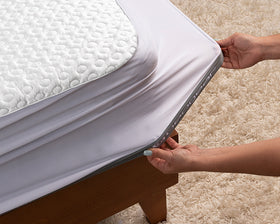888-996-9890

Eastern Medicine for Sleep
We need sleep to perform our best physically, emotionally, and mentally. Traditional Chinese Medicine can provide some insight into addressing insomnia and other sleep issues that are keeping you up at night or making it difficult to fall asleep. If you’re having issues with sleeping soundly, try the tips below and see if these Traditional Chinese Medicine techniques are right for you.
Why is Your Sleep Suffering?
According to Traditional Chinese Medicine, insomnia and other sleep disorders can be attributed to an imbalance in qi, or our energy. As qi circulates across our systems, it flows through our bodies’s “meridians,” including areas like the lungs, heart, spleen, liver, kidneys, stomach, gallbladder, and so on. According to the ancient Taoist concept of yin and yang, of the twelve main meridians, six are yin and six are yang.
These opposing energies wax and wane throughout the day, taking turns going up and going down. At night, yin energy that is tied to coolness is strongest in the body, and during the day, yang that is tied to heat takes over.
Sleep disorders are usually attributed to imbalances of yin and yang within the body. Oversleeping is a yang deficiency, while insomnia is a yin deficiency, and is associated with poor circulation, spleen deficiency or stress. Nightmares are associated with emotional imbalances or overindulgence in rich foods.
Eat More Yin & Avoid Yang at Night
An overactive liver could be the cause of poor sleep according to TCM. To ease the strain on your stomach, avoid alcohol and caffeine at night in addition to sweet, pungent, or spicy foods, which are considered yang foods.
Instead, go with foods that are predominantly yin. These foods are usually green or pale colored with a high moisture content. Items like tofu, cucumber, bananas, watermelon, and green beans fit the bill. For dinner, you can try things like pork and fish, which are considered neutral.
Key Ingredients for Better Sleeper
In TCM, there are several herbs and ingredients that are used to help balance those opposing energies. A cup of chrysanthemum tea clears yang/heat energy from your liver and calms your nerves. Add goji berries to balance the tea’s inherent yin properties and nourish your liver.
Other ingredients that encourage good sleep include the longan fruit, which is believed to improve circulation. You can eat them raw, dried, or steeped as a tea with some red jujubes and goji berries that can boost circulation.
If you have crushed or powdered poria, a type of fungus that’s also called fu ling or tuckahoe, you can add it to a bowl of warm congee and eat it a few hours before you go to sleep for some of the best possible sleep.
Jujube seed is frequently prescribed by TCM practitioners to treat insomnia. It increases circulation and calms the mind so that you are less irritable and restless. You can also steep jujube seeds to drink it as a tea. You can also simmer the seeds along with longan flesh and poria to make soup.
Give Yourself an Acupressure Massage
Behind the ear is an acupressure point called anmian. That translates to “peaceful sleep,” and it’s used in TCM to help with insomnia. Sitting between the ear and the base of the skull, there’s a slight depression next to a bone called the mastoid process. If you put your finger on this depression and apply light pressure in a circling motion to massage it, after a few minutes you should feel more relaxed and ready to rest.
Try Acupuncture
Acupressure is not the only TCM technique used for improved sleep. Acupuncture has also been scientifically shown to be an effective treatment for insomnia. In addition to treating insomnia directly, acupuncture also alleviates symptoms of medical disorders that can lead to insomnia like generalized anxiety disorder and schizophrenia.
Soak your Dogs in Hot Water
Massaging your lower legs and feet helps to encourage the blood to flow away from an overstimulated brain. To add to this effect, soak your feet in hot water as it dilates blood vessels in the lower legs. Fresh or powdered ginger can also reinforce the body’s yang energy, and adding it to the soak can assist people with cold extremities. When you start to sweat a bit or feel good and warm, you can pull your feet out and get ready for bed.
Sleep Schedules are Good
It’s also a good idea to start getting up as the light comes up and start winding down for bed as the sun goes down. Sleeping at random hours interrupts the proper flow of yin and yang in the body, causing insomnia and keeping you from getting restful, restorative sleep. When you’re getting ready for bed, keep things dark. Our bodies need the dark to produce the hormones that allow us sleep.
Go to Bed Between 9 & 11 pm
According to TCM, our various organs function and replenish themselves at different times of day. As we sleep, the gallbladder, which is associated with emotions and judgement, and the liver, which is tied to circulation and emotional well-being, repair themselves. Not getting enough sleep depletes the energy reserves of those organs, which can lead to bad judgement and emotional instability.
Make Meditation Part of Your Routine
If you’re interested in upgrading your bedroom, you can look at all our products for more information about how they can help you sleep great. If you have any questions we’d be glad to help. You can reach out over the phone or through email at info@bedplanet.com. We know that sleep is important to you, and it's crucial to us. Allow us to help you find the perfect bedroom setup for your needs so that each and every night is the best night of sleep.





